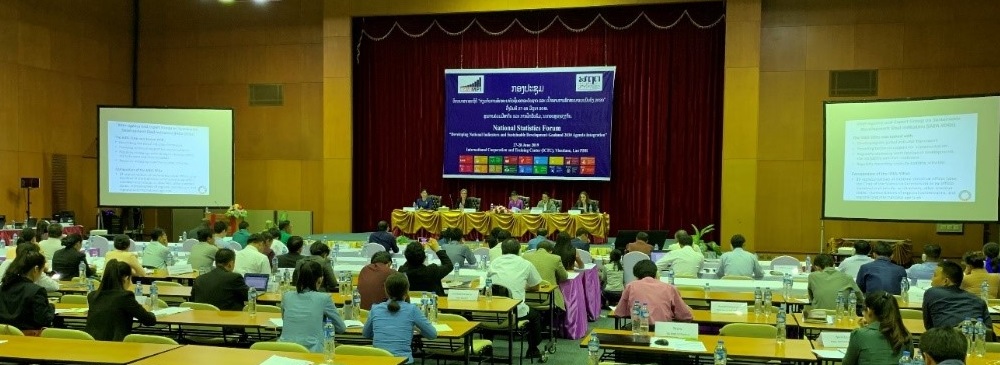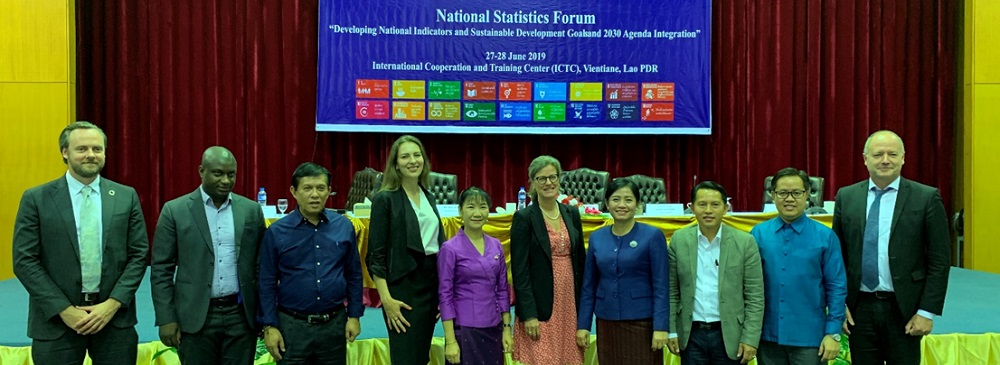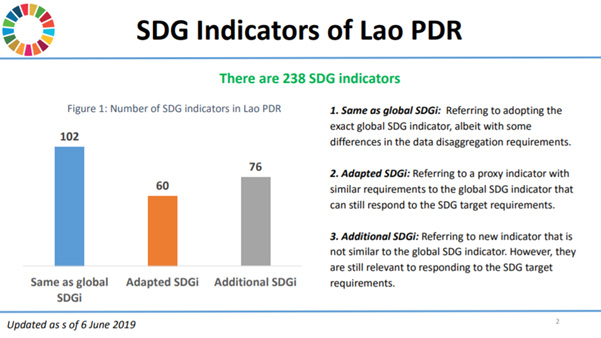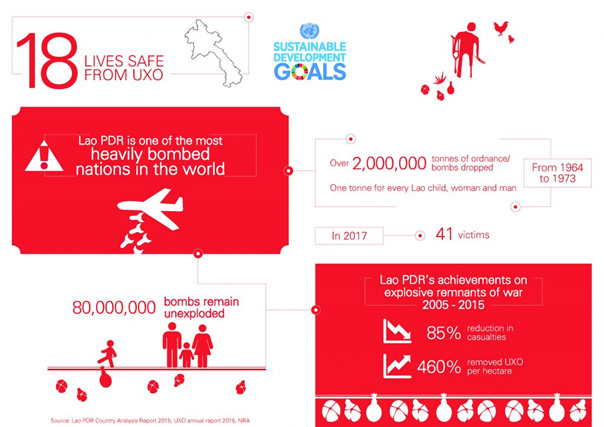Lao PDR
I. General on SDG monitoring set up
National SDG organizational set up
The Government of Lao PDR is working towards achieving 18 Sustainable Development Goals, including Lao PDR’s nationally adopted SDG 18 on “Lives Safe from Unexploded Ordinance”. The Prime Minister chairs an inter-ministerial SDG Steering Committee to oversee and advise on SDG implementation that includes the Ministry of Foreign Affairs (MoFA) as the bridge between local and international actors, the Ministry of Planning and Investment (MPI) with primary responsibility for mainstreaming the SDGs into national planning and the Lao Statistics Bureau (LSB, currently part of MPI) to support monitoring to track progress. The National SDG Secretariat at MoFA, consisting of MoFA, MPI and LSB, provides support to the inter-ministerial Steering Committee.
National set of SDG indicators
Lao PDR was among the earliest countries to localize the SDGs and integrate them into its national planning framework. To this end, the Eighth National Socio-Economic Development Plan (NSEDP) 2016-2020 has the SDGs embedded into its three outcomes, each of which relates to one of the three dimensions of the 2030 Agenda: economic, social, and environmental. Nearly 60 percent of the Eighth NSEDP indicators are linked to SDG indicators. The Government endorsed 238 SDG indicators during the National SDG Steering Committee Meeting held on 11 June 2019, among which 102 are “same as global”, 60 “adapted” and 76 “additional”. Lao PDR has also added an additional SDG 18: Lives safe from UXO (unexploded ordnance) and corresponding indicators. Of the total 238 indicators, 71 indicators have been mainstreamed into the Monitoring and Evaluation Framework of 8th NSEDP. In additional, about 30% of the SDG indicators are mainstreamed into the respective sectoral strategies/plans. The list of SDG indicators is intended as a living document that can be revised to reflect the ongoing circumstances of the country’s development. The Government, supported by development partners, is continuing to incorporate the SDG agenda into national goals, targets and indicators in preparation for the Ninth NSEDP.
SDG reports and Voluntary National Reviews
Lao PDR intends to present its second Voluntary National Review (VNR) in 2021 of progress towards the 2030 Agenda, with the intention of linking this as closely as possible to the process for implementing and monitoring progress on the NSEDP, and also tracking progress made since the 2018 VNR.
Lao PDR has chosen to use the OpenSDG platform as its national reporting platform for SDG indicators. A beta version has been set up and will be populated with indicators and metadata as it is made available.
Overall coordination of National Statistical System
The National Statistical System (NSS) of Lao PDR includes the Lao Statistics Bureau (LSB), Statistics Centers at line ministries and agencies and Statistics Centers in provinces, municipalities, districts, sub-districts and villages. LSB holds the status equivalent to sub-ministry, under the Ministry of Planning and Investment. LSB is a center for coordination with line ministries, agencies and provincial authorities in the management, evaluation and execution of statistical activities.
The Strategy for the Sustainable Development of the National Statistical System 2016-2025 and Vision toward 2030 aims to improve and strengthen the foundation for the development of statistical production both in terms of quantity and quality, to ensure that the National Statistical System (NSS) is aligned with international standards, and to build credibility of the NSS with the public sector, development partners, donors and the private sector both domestically and internationally. It also aims to make available economic, social and environmental official statistics to users ensuring high quality, timeliness, transparency and credibility; to ensure that the production of official statistics is efficient by using modern information systems and methods; and to involve all stakeholders in society to actively participate in statistical production with high commitment and responsibility. Its work programmes include establishing technical teams to support the cooperation between the government and international organizations in preparing and providing development indicators, particularly SDG indicators.
SDG data coordination committees
The Prime Minister chairs the National Steering Committee for SDG implementation, while the National SDGs Secretariat, led by the Ministry of Foreign Affairs (Department of International Organizations) and Ministry of Planning and Investment (Department of Planning and Lao Statistics Bureau), works with line ministries to track the progress of SDG implementation.
Responsibility for SDG indicator compilation
Responsibility for indicator compilation shared between LSB and line ministries in accordance with their thematic areas. Among the owners, the Ministry of Health (39 indicators), Ministry of Agriculture and Forest (30 indicators) and Ministry of Natural Resource and Environment (28 indicators) are the top three ministries responsible for close to half of the national SDG indicators.
Data sharing is addressed in the Statistics Law (2010), which states that the Statistics Centers of line ministries and agencies must report to LSB in accordance with the reporting procedure. All members of the NSS at all levels are responsible for the accountability and accuracy of the statistics report to respective statistics organizations above them and to LSB in accordance with law.
Actual data sharing mechanisms
Data is generally shared in the form of printed publications and reports or via email in Excel or PDF format.
IV. Data availability and disaggregation
Work to make more indicators available
A consultant recruited from the project is working closely with the Lao Statistics Bureau (LSB) to facilitate the compilation of SDG indicators and metadata in Lao PDR by analyzing existing data sources and advising LSB and/or other responsible members of the national statistical system (NSS) on how to produce SDG indicators that are obtainable but have not been compiled in the country. The consultancy aims to assist LSB in the compilation of metadata for these indicators and to provide capacity building to LSB and other responsible members of NSS on the compilation of both data and metadata for SDG indicators.
A three-day SDG metadata workshop was conducted with the support of the project in August 2019 and attended by participants representing around 20 line ministries and agencies. The workshop covered the nature and purpose of metadata and the importance of using metadata standards to describe SDG indicators and their data sources. The SDG indicator metadata template was demonstrated, and attendees participated in hands-on exercises to complete the template for SDG indicators relevant to their organizations. LSB presented the way forward on the compilation of national SDG metadata. Metadata continues to be compiled through consultation with ministries and agencies of the NSS.
In June 2019, UNSD facilitated a national user engagement workshop in Lao PDR, which was attended by staff members from LSB and various line ministries involved in SDG data production and dissemination, as well as representatives of various user groups that make use of the data. Participants worked in groups to develop various sections of a user engagement strategy, which was endorsed by LSB.
Implementation plan and activities
As Lao PDR prepares for its second VNR in 2021, a number of activities are planned to make more disaggregated indicators available to a wide range of users with the help of an online SDG reporting platform. This work is supported through the project by a consultancy and through a partnership with the UK Office of National Statistics, which supports the OpenSDG platform.



